#prosopagnosia
Text



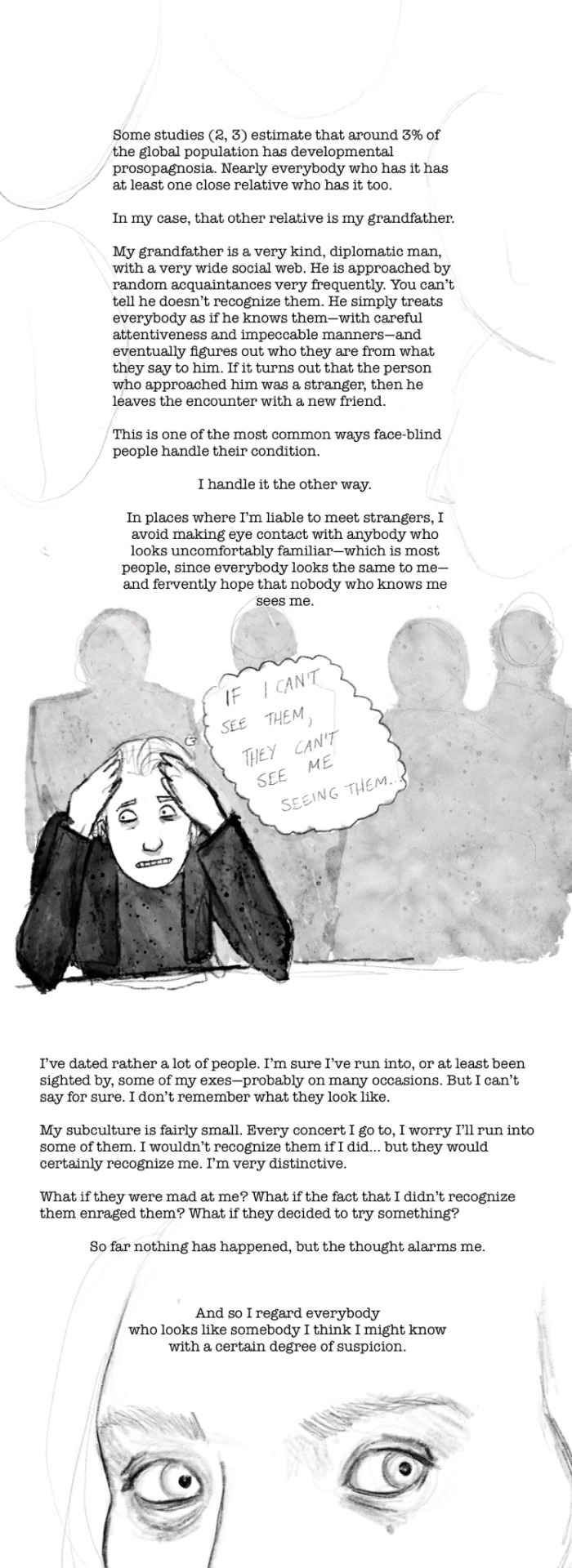






This is my final project for a summer English class I’m taking! Once everything’s graded, I’ll finally have an associate degree.
I hope you guys enjoy the comic. It has devoured my week. As always, reblogs are greatly appreciated!
EDIT: I’m really glad this comic is resonating with so many people! From all of you guys’ many comments, it looks like this is something that many of you relate to. It’s prompting more discussion than anything else I’ve ever made, no contest—it has more comments by far than pieces with with tens of thousands more notes, and they’re all very interesting and informative.
So if anybody is feeling alone in this, go ahead and look through the tags and replies! Looks like we’re all in this confusing little boat together.
19K notes
·
View notes
Text
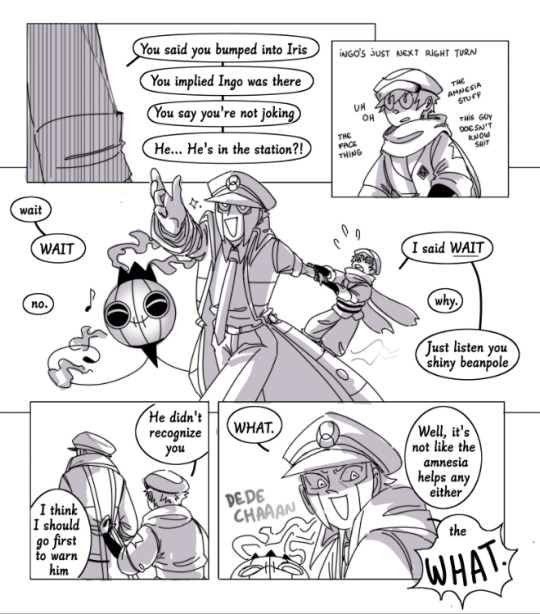
First | Previous | Next
Rei has no filter
#submas#subway bosses#submas au#subway boss emmet#emmet#pla rei#rei#chandelure#post pla#pla au#my art#prosopagnosia#giving Emmet whiplash is my favorite hobby
754 notes
·
View notes
Text
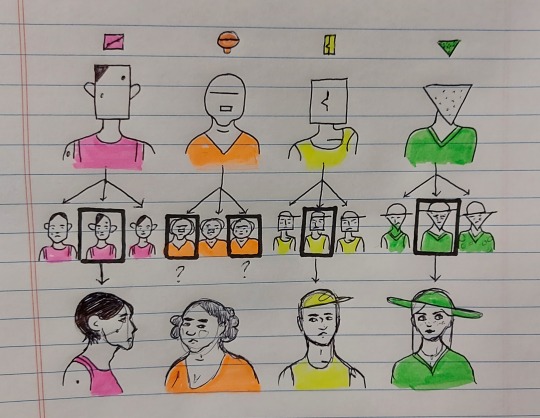
I don't know how to explain, but I'm face blind, I could recognize this stranger anywhere, those wildly different people look identical, and I don't know who you are
462 notes
·
View notes
Text
Prosopagnosia (face blindness)
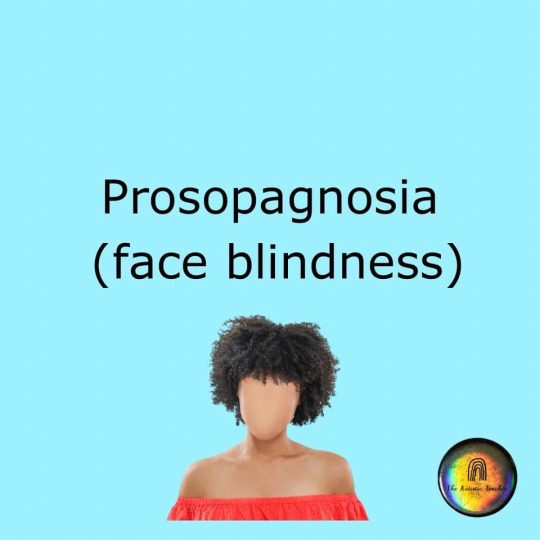
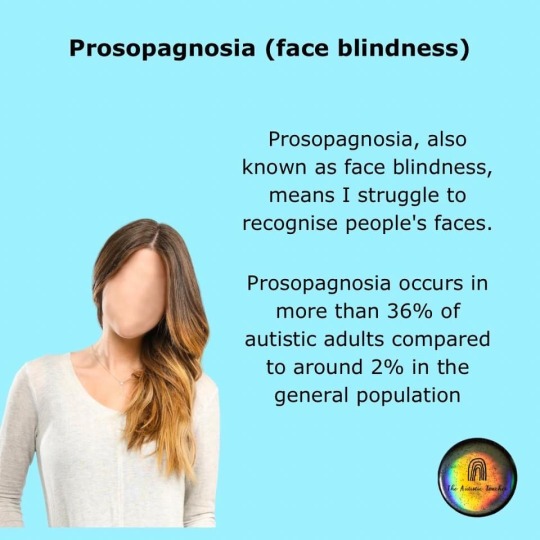
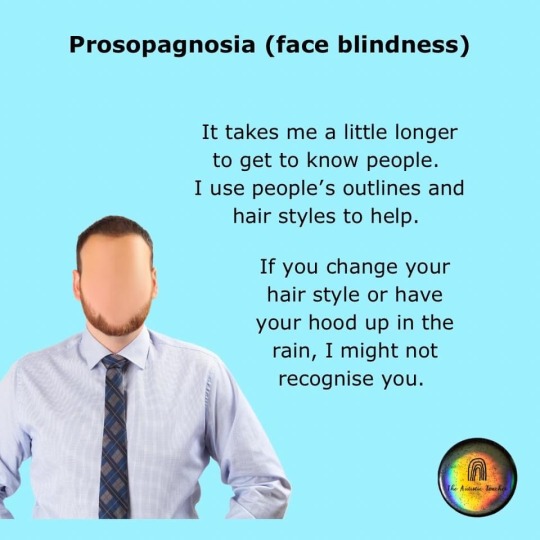

The Autistic Teacher
#autism#actually autistic#face blindness#prosopagnosia#autism traits#signs of autism#autism signs#neurodivergence#neurodiversity#actually neurodivergent#feel free to share/reblog#The Autistic Teacher (Facebook)
252 notes
·
View notes
Text
Prosopagnosia/face blindness = a condition where you have difficulty recognizing people's faces.
–
We ask your questions so you don’t have to! Submit your questions to have them posted anonymously as polls.
#polls#incognito polls#anonymous#tumblr polls#tumblr users#questions#polls about sleep#submitted nov 25#polls about brains#prosopagnosia#face blindness#face blind#sleep#dreams#dreaming
256 notes
·
View notes
Text
Concept: Fire-sibs with Congenital Prosopagnosia. They’re face-blind.
Azula is fine. She chose 2 friends with extremely distinctive voices & body-language and decided that was enough. Recognizing anyone else is beneath her station as a princess. If they were important they’d wear a crown.
Zuko on the other hand has been on this ship for 3 years and he’s concerned that if he doesn’t capture the Avatar soon, this group of middle-aged men might begin to suspect can’t tell them apart.
Literally any disguise will fool Zuko. Cover Aang’s tattoos and he can’t pick him out of a lineup. Fortunately water-tribe teens are rare outside of the poles, and Aang has a habit of declaring himself the Avatar so he stands a chance as long as they don’t catch on…
Bonus: Ty Lee’s sisters don’t even look that much like her. It’s just a standard familial resemblance. But Zuko and Azula both made the mistake several times as children and have complained about how hard it is to tell them all apart, and nobody bothered to correct them (because royalty) so Ty Lee believed them.
#prosopagnosia#zuko#Azula#the crew already knows Zuko#Zuko can use his seeing-face Uncle for encounters with other military personnel#but he can’t use him every time he needs to differentiate lt jee from the cook
2K notes
·
View notes
Text
The beginner autistic guide to common terms in our community (with extra context!).
*Disclaimer, I’m not a professional. This is just knowledge from my experience as an autistic person. Please feel free to correct anything :)
These definitions will include some of my own opinions and thoughts, especially on the more controversial terms. This is simply to help better prepare new autistic community members for conversations they become engaged in. Having all the perspective and context you can have can be very helpful when moving into new social spaces.
Autism (Or Autistic Spectrum Disorder, ASD): A neurodevelopmental disorder that is present from very early childhood. It’s mostly recognised through difficulties with social interaction and restricted and/or repetitive behaviours. The way it is referred to as “Autism Spectrum Disorder” is specifically referring to the fact that autism presents in countless ways. There are common traits and patterns, but the severity and complexity of those traits and symptoms is infinite.
NOTE: This does not mean that ‘everyone is a little bit autistic’. You are either autistic or you are not. It just means that if you have autism, it may present very differently to other autistic people you know.
Asperger’s Syndrome: Asperger’s syndrome is usually considered an older term for a ‘subtype’ of autism. The term is considered outdated by the DSM-5 and no longer used in that document. However it is still used in a lot of other countries. Now it is becoming more socially known that ‘Asperger’s syndrome’ is just a specific presentation of autism. Many autistics don’t like the use of the word ‘Asperger’s’ because of a couple reasons:
The term has a long history with NAZI’s and eugenics.
The term seems to basically mean ‘high functioning’ autistic, which simplifies the condition.
Asperger’s Syndrome is defined in a very similar way to autism, however people with “Asperger’s’ may be described as ‘gifted’ or ‘intellectual’.
It’s important to note that many people still identify themselves with the term ‘Asperger’s’. While it is good to be educated and up to date with terminology, some people have identified with this term their whole life and it’s not wrong to use the term for one-self. But either way, I do encourage you to do more research if you are comfortable.
Neurotype: Can be basically defined as the type of brain function one has. Some people consider autism a neurotype, and then neurotypical as another neurotype. However, many people claim that autism is ‘just another neurotype’. This is a harmful way of thinking about autism because autism is a disability. Labelling it as a ‘neurotype’ belittles all the struggles autistic people have that make them disabled. Autism is a spectrum and so some autistic people may not really consider themselves disabled, but many do.
Neurotypical (NT): A non-autistic person with no other mental conditions.
Allistic: A non-autistic person who can still have other mental conditions, such as depression or ADHD.
Neurodivergent (ND): Traditionally ‘Neurodivergent’ has been used to mean either autistic or ADHD. However in some contexts it is used to mean someone with any mental condition, including personality disorders or mental illnesses such as depression and anxiety.
Neurodiversity: a term used to describe the fact that there are many neurotypes in the world. It is used to imply that differences in brain development and function should be accepted as relatively normal. I think this is a good sentiment, but that some neurotypes should still be considered disabilities as well as a neurotype, so as not to diminish the struggles specific neurotypes go through.
High functioning/Low functioning: The labels of functioning are terms used to describe how independent an autistic (or other kind of disabled) person is able to be. Many autistics do NOT like the use of these terms for a couple reasons:
It tends to focus on the way an autistics disability affects the allistic people around them.
It simplifies the experience of the individual with autism to how independent they are, and is also not very descriptive for anyone trying to help the said autistic person.
High needs/Low needs: These are labels used to describe how much assistance an autistic (or other kind of disabled) person may need. It is slightly preferred by autistic people as the language is more centred to what the autistic person needs, rather than how independent they can be.
NOTE, many autistic people would argue that these terms are basically the same as high functioning and low functioning. I personally consider it to be best to just state someones highest needs or difficulties. For example “Olivia is nonverbal and highly sensitive to light and noise.”.
Masking: Masking is the act of hiding ones autistic traits to appear to be neurotypical. Masking is often a survival strategy developed by autistics to evade bullying or isolation. Masking can include suppressing the urge to stim, forcing oneself to make eye contact, learning how to ‘properly’ execute facial expressions, studying body language, etc. Masking can be an extremely vital skill for autistic people, but when an autistic person has to mask for long periods of time it can lead to negative consequences such as burn out or meltdowns. Masking can also be used in the context of other disabilities, such as ADHD.
Scripting: Scripting is a form of masking, when an autistic person pre-plans or practices responses or entire conversations. You may have a script you unconsciously follow for questions like “how are you?” Or “how is work?”, etc. It may be inspired from TV shows, movies or observing other people interact.
Burn out: Burn out is when an autistic person reaches their limit and has decreased energy for an extended period of time. Burn out may last anywhere between a couple days or a few years. Burn out is often caused by excessive masking, but can also be caused by repeated rejection, bullying or other mental conditions. Burn out is not the same as depression, but it can co-exist with depression.
Meltdown: A meltdown is when an autistic person experiences what might look like a ‘tantrum’. The person may be very angry, yelling, punching or hitting things (or themselves). They may be aggressively stimming or humming to themselves. A meltdown, internally, feels as if you are completely filled with negative energy, as if you might burst. It can feel like extreme irritation, or anger, or shame. Meltdowns can be caused by any number of stressful situations. For an autistic person this can be having a lot of social events, their routine being disrupted, having to eat foods they don’t like, being overstimulated, or even just negative social interactions.
Shutdown: A shutdown is very similar to a meltdown, in how it can be caused. For me personally, I tend to have a shutdown if I am not in a safe place to have a meltdown. From the outside it looks very similar to dissociation, and it can co-exist with dissociation. It typically feels like you are shutting down, turning off. You emotions were about to burst and then you just went numb. You may be unable to move, or go non-verbal. You may be crying quietly or you may simply just very suddenly feel the need to go home.
NOTE: Meltdowns and shutdowns can appear to feel like a panic attack, but they are different. Panic attacks come from intense feelings of dread or doom. Meltdowns and shutdowns come from repeated, or intense, stressful situations for an autistic.
Hypersensitive: Hypersensitivity is when the brain processes sensory input (such as touch, taste and smell) as much more intense than a neurotypical person would. This can mean that a slight cold breeze may feel painfully cold. Or looking outside a window can hurt ones eyes because it feels too bright. Or having to wear specific textures to stay calm.
Hyposensitive: Hyposensitivity is the opposite of hypersensitivity. It is when your brain inteprets sensory input as much less intense than a neurotypical would. Ways this can present in an autistic person include not realising when they hurt themselves, having a high pain tolerance, being unaware of temperature changes, etc. You may also not recognise your bodies hunger cues, dehydration or need for sleep.
NOTE: An autistic person can experience both hypersensitivity and hyposensitivity. It can also fluctuate day-to-day.
Sensory Processing Disorder (SPD): SPD is basically the term for experiencing lots of variation in your sensory input. It is similar to Auditory processing disorder. Which is where your hearing is technically fine (you aren’t any form of deaf), but you have trouble distinguishing what specific sounds are, or listening to one, important sound, in an area with lots of different noises (for example, being unable to understand what someone is saying next to you, because the TV is on.)
Overstimulation: This is when an autistic person has been experiencing too many different sensations at once, or for an extended period of time. This may be caused by too many noises happening at once. Or even just one annoying sound repeating for a long time. It can also be triggered by touch, taste, sight and smell.
Executive function/dysfunction: Executive function is the term used to describe how the brain initiates tasks. For neurodivergent folk, our executive function is often dysfunctional. This means we can often find it difficult to start new tasks. A way you may experience it is when you are sitting down, you may be screaming internally that you need to go and get some food, but your body seems unwilling to co-operate. Having executive dysfunction does not mean you are lazy, or do not want to do the task, it means you may be unable to do the task.
Autistic intertia: Autistic inertia is related to executive dysfunction, because it is a term that helps describe how autistic people struggle to switch or initiate tasks. “ An autistic at rest remains at rest, and an autistic in motion remains in motion”.
Special interest/Hyperfixation: A special interest is a extremely long term interest/obsession with a particular topic. An example might be being really into pokemon. Learning all the different types of pokemon, playing all the games and collecting heaps of merch. A hyperfixation is a more short-lived interest that can be destructive in it’s severity (for example, it might get so extreme that it’s the only thing you can think about, to the point where you neglect your needs). Special interests are less likely to be destructive. But hyperfixations can be healthy and normal too.
Stimming: Stimming or self stimulation is the act of doing repetitive movements to help self regulate. Stimming can look like spinning, chewing, flapping hands, dancing, foot tapping, pen clicking, touch soft fabrics, using weighted blankets, lighting candles, eating crunchy snacks, etc. All of these forms of movement or repetitive sensory input can help us regulate our emotions better, prevent a meltdown or shutdown, or focus on a task easier.
NOTE: Echolalia is another term you may hear. It is a form of stimming in which an autistic person repeats sounds/phrases over and over.
ADHD: Attention-deficit/hyperactivity disorder is a neurodevelopmental disorder like autism, but it affects the brain in different ways. It often presents as having difficulties with paying attention, regulating emotions and hyperactivity (or, alternatively, it can present as being inattentive).
Savant or Savant syndrome: A condition when someone with some type of significant mental disability is an expert/’savant’ in a particular field, to the point of surpassing neurotypical experts. An example might be having photographic memory, or being able to learn languages extremely easily, or being an extraordinary mathematician. Autistic people often don’t like to hear the term ‘savant’ as we are often only valued by ‘society’ if we are savants. And if we are not, then we are often treated as lesser. This is kind of a form of eugenics.
Eugenics: Eugenics is a philosophy or belief that we can selectively breed humans to ‘improve’ humanity. Or create the ‘perfect race’. This was an idealogy practiced by Adolf Hitler during WWII, which lead to the holocaust. Eugenics is often a subtly underlying philosophy behind many statements that, on face value, seem relatively harmless. For example - “autism is the next step in evolution” is currently a popular statement. However, this implies that every other neurotype is not an improvement, which therefore implies that being autistic is superior. This would be considered a form of eugenics. Eugenics is considered a horrible philosophy because it encourages people to look down on others and dehumanise anyone not like themselves.
Co-morbidity: A co-morbidity is the term used for a condition that is regularly seen in conjunction with another condition. For example, autism and ADHD are often seen together. However, it can also be used to simply describe someone who has more than one condition (physical or mental).
AuDHDer: Someone with autism and ADHD. Just a shortened way to refer to people with both disabilities.
Selective mutism/Situational mutism: When an autistic person (or other neurotype) experiences periods of being unable to speak or communicate. This can often occur in stressful situations, like before tests or during doctors appointments. It is officially referred to as ‘selective mutism’ but many are trying to change it to ‘situational mutism’ as the individual does not willingly choose when they go non-verbal.
Alexithymia: Alexithymia is typically described as the inability to define and/or describe ones emotions. So you may often feel a type of discomfort, but not be able to label what it is. Not being able to distinguish between anger and irritability. Or not knowing if you feel sad or confused. It can make seeking professional help for many conditions really difficult, as you are unable to put your experience into words. It can also be similar to hyposensitivity in the way that it makes it difficult to understand what you body is feeling.
Dyspraxia: Dyspraxia is a disorder that affects co-ordination, movement and balance. It can make things such as sports, driving, cooking and writing difficult. It is fairly common in autistic people.
Prosopagnosia: The inability to recognise/remember faces. It is more common in autistic people.
Synesthesia: Synesthesia is when one form of sensory input is sometimes also experienced as another. For example, someone with this condition may see colours when they hear someones name. They may hear a song and get a taste in their mouth. This is also more common in autistic people.
FINAL NOTE: Autism is a spectrum and you may not experience all of these different terms, or you may not experience them in the way I described them. That does not mean you aren’t autistic. This is not a diagnostic tool. This is simply a guide to learning the terms you may often hear when discussing autism.
#autism guide#autism#ASD#autism spectrum disorder#terminology#autistic terms#definition#neurodivergent#neurodiversity#allistic#aspergers#alexithymia#prosopagnosia#dyspraxia#actually autistic#synesthesia#auDHD#ADHD#autistic inertia#situational mutism#selective mutism
1K notes
·
View notes
Text
So, funny story: I… may have prosopagnosia.
I’ve never had it diagnosed or anything, but the symptoms match a bit too well with some of my experiences. Like, I don’t remember any of my schoolmate’s faces despite having had seen some of them for twelve years straight… except for two girls. Who had similar hair and height, so I had no way of telling them apart at a distance other than face. And it took me like three years to figure out the difference. Their faces are nothing alike, and I cannot stress enough just how different they are.
That and a few other funny stories make me think I may have prosopagnosia.
But the silly part? I had no idea it was a thing until I watched DRDT.
So imagine how I feel, when this weird Veronika girl starts describing my life word for word and says it may be because of this thing. Imagine my reaction in that moment. I got fucking diagnosed by a fictional character, is what happened. I had to pause and rethink life for a moment there.
And now I can say: Teruko, girl, I feel you. Faces make no sense. There’s no way people actually remember what they look like that quickly. I feel represented. Thank you, Teruko Tawaki, for properly representing the struggle of not knowing who the hell someone’s talking about until they describe hair and clothes.
#drdt#danganronpa despair time#fanganronpa#does this mean veronika changed my life?#i guess#veronika grebenshchikova#teruko tawaki#prosopagnosia#i guess i can tag that
62 notes
·
View notes
Text
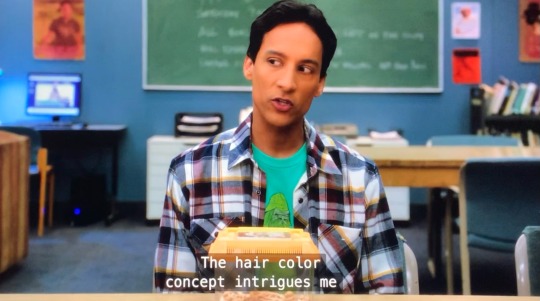
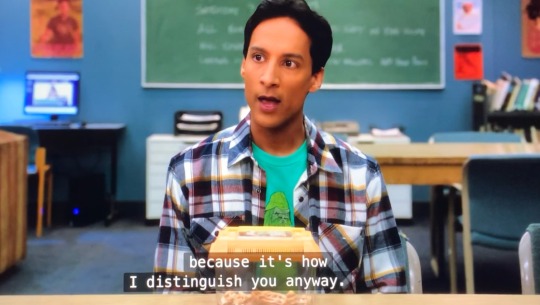
Abed face blindness moment
132 notes
·
View notes
Text
I know your voice
Whumpee finds Caretaker after a loong time apart and hopes to reunite. Whumpee got strongly attached but neither of them expressed something over regular politeness before.
When Whumpee's coming up to say hi to Caretaker, they hear (C:) "I'm sorry, but... would you mind introducing yourself?"
Caretaker doesn't remember? Of course not. Whumpee was just one of many people Caretaker treated and helped. Why would Caretaker remember a random patient after so much time passed?
So Whumpee just brushes it off "Oh, I'm... I'm no one, actually. I'm just- you helped to heal my wounds some years ago. I came to say thanks"
"You're very welcome then. But I'd still like to know a name of the person thanking me"
At this point Whumpee just wants to leave. They let themselves have high hopes. They let themselves believe that Caretaker would actually miss them just as much.
Whumpee gives his name and notices a sudden change in Caretaker's facial expression. From serene indifference to shock.
"Whumpee... Dear goodness! How did you find me? It's been so long," they embrace Whumpee in a strong hearty hug. "I knew you sounded familar!"
Caretaker couldn't regonise faces. They just didn't have an occasion to mention it before.
------------------
#whump prompt#caretaker#whump#reunion scene#I tried to make a research on prosopagnosia but ngl i'm still nervous i got something wrong.#If I did please feel more than welcome to let me know!#prosopagnosia#whumpee#writing#whumpee x caretaker#emotional whump#tw recovery whump#whump recovery#whump aftermath#writing comfort#whump prompts#whump angst#angst#angst whump
138 notes
·
View notes
Text
So sick of going into tags relating to my disabilities and finding nothing but fanfic and whump. Can you just fucking not
#brain injury#neurological illness#actually disabled#prosopagnosia#cripple punk#Literally any relatable posts are just completely drowned out with weirdly fetishising fanfic every single time
93 notes
·
View notes
Text
Alright, quick question to those with face blindness/prosopagnosia:
When you read a book/text and a character is described...
68 notes
·
View notes
Text
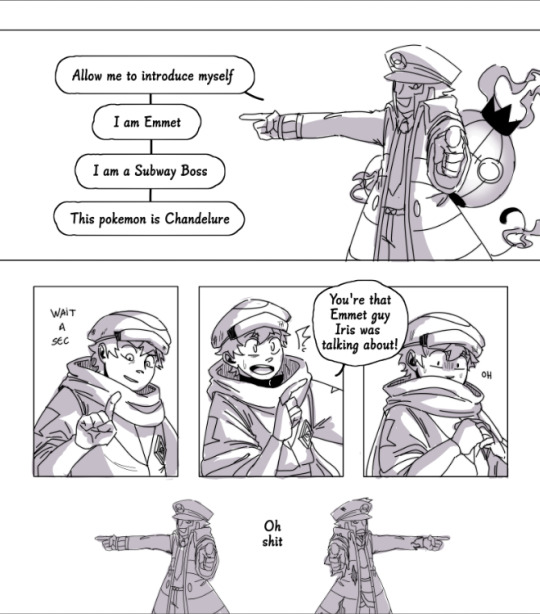
First | Previous | Next
Rei's connecting some dots. He's not liking it tho
#submas#subway bosses#submas au#subway boss emmet#emmet#subway boss ingo#ingo#warden ingo#pla rei#rei#chandelure#post pla#pla au#my art#prosopagnosia
605 notes
·
View notes
Photo

Tamy Glauser
Gender: Non binary (they/them)
Sexuality: Queer
DOB: 2 January 1985
Ethnicity: French, Swiss, Nigerian
Occupation: Model, writer, activist
Note: Has prosopagnosia (face blindness)
#Tamy Glauser#enby#nb#lgbt#lgbtq#non binary#queer#1985#biracial#french#african#swiss#nigerian#model#writer#activist#prosopagnosia#disabled
57 notes
·
View notes
Text
Prosopagnosia (face blindness)



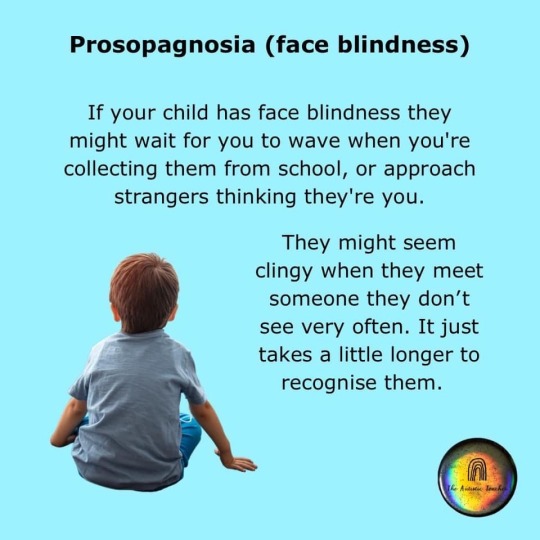
The Autistic Teacher
#autism#actually autistic#autism awareness month#autism acceptence month#prosopagnosia#face blindness#no wonder I cant recognize people when I see them#I’ve always listened to thier voice and can tell who it is most of the time#I’m sure some of you can relate#neurodivergence#neurodiversity#actually neurodivergent#feel free to share/reblog#The Autistic Teacher (Facebook)
138 notes
·
View notes
Text
MDZS Prosopagnosia (face blindness) AU
I want an AU of MDZS except Wei Wuxian is face blind. I just feel like that would change so much, adding both comedy and terror to the story overall.
Innocent Youth
Jiang Cheng unwittingly cultivated his shouty persona from a very young age, because he subconsciously realized that his shixiong was more comfortable with him when he stood out from the crowd in this way. Similarly, in the post-resurrection days, jc always lets Zidian spark purple in a very obvious and prolonged way, so wwx doesn't have to linger uncomfortably in an awkward is-he-or-isn't-he-my-brother zone.
Jiang Yanli slowed herself down as a child, becoming very calm and quiet and slow-moving, because that's when her shidi is the most relaxed. She quickly learned the look on his face, when he's trying to figure out who someone is without giving away his weakness... when he's desperately waiting for someone else to use a name, to give him a toe-hold. She always greets everyone by name: just for wwx. She also often announces herself in the third person: others might find it weird, but her didi is always so grateful.
Wwx actually needs to use Jiang Fengmian's unfortunate teeth as a marker to differentiate him from his son, once Jiang Cheng reached his adult height. (The frog on Sandu's hilt really helps, too.)
A lot of the shidis in the Jiang Sect know about wwx's special issues, and totally riff on him by switching their swords and hair ornaments just to fuck with him. They can't switch their fighting styles, though, so the Jiang quickly become a sect where instant spar-offs happen often and are no big deal.
All the people who love wwx have adjusted for this in many ways, realizing that they either need to verbally identify themselves or adapt distinctive clothing/mannerisms/scents/body language.
Wwx wears clothes that don't match any sect because sect uniforms make everyone so homogeneous that he can't even discern gender, much less individual people. (Uniforms actually give him mental heebie jeebies, because they make his life so hard and uncertain.)
Cloud Recesses Student Arc
Wwx has to ask before he fights whether it's going to be friendly or to the death, since he doesn't always know if the person he's fighting is a friend or foe. Wwx defaults to treating all fights as friendly fights (which is why he never even unsheathed his sword when lwj attacked him that first night in Cloud Recesses) because he can't stand the thought of hurting a friend, or just someone innocent.
Lan Wangji is very still. Very still, very quiet, very tall and always wears white and smells of sandalwood. He is easy to recognize. ... Except when he could be Lan Xichen. If there's a smile, or any color, then he's Lan Xichen. (This means that wwx immediately knows who kissed him on Phoenix Mountain, because he doesn't use his sight to identify, well, anyone.)
Nie Huaisang becomes a friend because of his choppy, erratic, fast-paced motions, both when he is speaking and moving. Also, he's unusually short so that helps.
He is secretly fond of Lan Qiren because that dreadful and unflattering beard is such a great identifier. He loves Nie Mingjue because he's literally and distinctly larger than everyone else. Later, he will become immediate friends with Sisi, because dramatic facial scarring is the best cue there is for someone like him. (Is anyone fat? He likes fat people. He likes tattooed people. He'd have loved Mo Xuanyu with his Hanging-Ghost-painted face, because, wow, that's so obvious. Xue Yang's missing pinky finger is so helpful.)
Wei Wuxian knows everyone's swords VERY WELL because he can recognize them and use them to identify which asshole in gold with a peony on his chest (for example) this dude might be. This is what he calls "my poor memory". But it actually means that Jin Zixuan looks exactly like Jin Zixun to him, if not for Suihua.
Burial Mound Days
He's got a string of orphans, and calls them all A-Yuan. No, seriously. Word has got out, and all the homeless babies know they can move into the Burial Mounds and get doted on by EVERYONE because no one there is about to correct the Yiling Patriarch.
Dead Wen Ning is easy to pick out because of his stiff gait, awkward stance and distinctive pallor with the black veins. This makes him an automatic wwx favorite. (The stuttering helped, even back when he was alive.) Wen Qing is tiny, and also, no one else is wearing Wen robes, so she becomes a good friend, too.
He actually really likes all fierce corpses, because the way they move is so distinctive that he always knows what he's dealing with.
Can you imagine how fucking terrifying the world must be when you know that all Wen Zhuliu needs to do is put on a different robe and then he can walk right up to you and wreck your core? Same goes for wrh, jgs, jgy, wc, you name it. Talk about hypervigilance.
Think of all the talismans he's invented to keep himself and the Wen Remnants safe because he knows he can't tell friend from foe and has to count on magic to do it.
Post-Resurrection
Lwj picked up on Jiang Yanli’s habit announcing herself by name instead of using “I”, and consequently uses third person for himself, too. The Junior Ducklings do it, too, although they don't understand why, at first.
Wwx cannot, for the life of him, tell lsz and ljy apart if they just stand quietly next to each other. Ljy will never think this is not hilarious. Especially because wwx will offer them chicken to see which one accepts it. (It’s foolproof.)
He is utterly and completely unable to tell the Twin Jades apart unless they're speaking. Lan Wangji has learned to announce himself simply to protect his brother from being leaped upon and kissed at random intervals. The whole sandalwood thing? Lwj marinates himself in it to give wwx a clue about who he is before he's within liplocking distance.
#MDZS#the untamed#wangxian#MDZS au#wei wuxian#prosopagnosia#face blind wei wuxian#face blindness#yiling patriarch#mojo muses#if anyone is inspired to write this#be sure to tag me!#face blindness is a shitty thing to live with#but it sure can be funny sometimes#and there's that element of horror too
923 notes
·
View notes